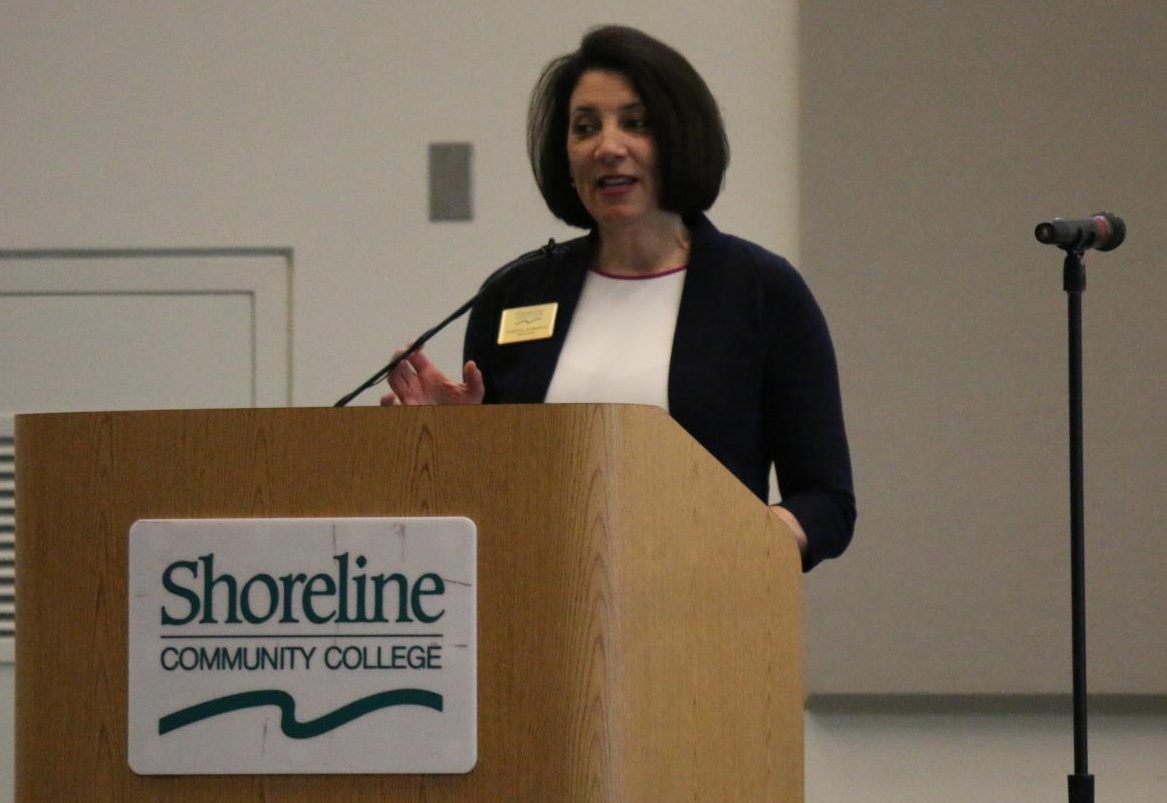SCC Sued by Former Executive Vice President
Accusations include unfair labor practices, infliction of emotional distress and violations of Washington’s Family Leave Act.
SCC Public Information Office via Flickr
SCC President Cheryl Roberts speaks at an employee anniversary awards luncheon, May 24, 2016.
April 29, 2022
Shoreline Community College (SCC) is being sued by former Executive Vice President Alison Stevens, who claims she was forced to retire early after feuding with then-President Cheryl Roberts.
In her complaint filed in King County Superior Court, Stevens lists seven grievances against the
college. Four accusations are forms of unfair labor practices as laid out in Washington’s Law Against Discrimination (WLAD), including discrimination, retaliation, hostile work environment and wrongful termination. The fifth complaint relates to violations of Washington’s Family Leave Act (FLA) and the remaining two grievances address intentional and unintentional infliction of emotional distress.
Per these allegations, Stevens is asking for an award of damages under violations of the WLAD and FLA, remittance for her attorney’s fees and costs, lost wages and emotional distress.
The majority of accusations in the case detail a feud between Stevens and Roberts. In 2018, Stevens served as interim president for six weeks while Roberts took leave. When Roberts returned, Stevens reported that she began to be more heavily scrutinized and that Roberts began to remove her duties, stating that Roberts blamed her for various problems facing the college she herself caused. Following this, Stevens reports being managed with an “authoritarian style” which resulted in distrust and fear of Roberts, according to the lawsuit.
Unable to deal with the hostility, Stevens announced her intention to retire in June 2019, which she claims was met with retaliation in the form of Roberts revoking the few duties she had left. Additional mentions of harassment include being referred to as “fragile” and being forced to sit separately from other employees in meetings.
According to the lawsuit, Stevens claims that the situation caused stress to the extent that her doctor ordered her to take medical leave. Stevens spoke with Veronica Zura, executive director of Human Resources, prior to requesting leave as she believed the request would be met with backlash. The day after Stevens’ 12-week leave was approved, Roberts offered another employee Stevens’ position for a 20-week duration.
That same day, Stevens was scheduled to meet with Roberts but when she arrived she noticed “the Executive Director of Human Resources was also present and both she and Dr. Roberts behaved in a fashion that Dr. Stevens recognized as reserved for employees whose employment is being terminated.” She was presented with a severance agreement that was presented as mutual and negotiated but was in fact imposed. When asked if she would have a job if she did not sign the agreement, Roberts stated she would, but at a reduced salary, a statement in violation of the FLA. Zura verbally corrected this statement later that day and Roberts herself backtracked on the statement when asked to confirm what happened during the meeting via email.
The leave was scheduled from January 2019 to the end of March 2019. Close to the time she was set to return, Stevens extended her leave for two additional months and in response, Roberts advised all staff that Stevens had extended her medical leave through the remainder of the academic year, so Stevens would not be returning because of her retirement date in June 2019. She did not return to SCC.
In the following months, Roberts announced her intent to retire on June 30, 2022. On Feb. 24, 2021, SCC’s Board of Trustees elected to retain Roberts following a vote of no confidence by the Faculty Senate. The majority of the faculty who participated voted for Roberts’ removal from her position, with those in favor of removal accounting for 116 out of a total 135 who voted. 10 members abstained while nine voted in confidence of Roberts. The total faculty senate contained 388 members, most of whom did not vote.
Despite this, the board later terminated Roberts’ contract that May.
Kristi Pimpleton of Sapphire Legal, attorney for Stevens, did not respond to requests for comment. Trial is scheduled for June 13, 2022.
Corrections made May 15, 2022. This article has been updated for clarity.
- Clarifying vote results. Previously reported that 116/388 voted “no confidence”, but did not mention total vote count.
- Cheryl Robert’s current status at SCC has been updated to reflect information about her termination.






